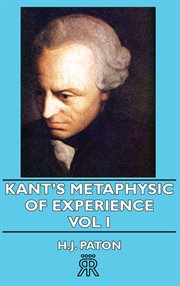Details
PUBLISHED
DESCRIPTION
1 online resource
ISBN/ISSN
LANGUAGE
NOTES
Contents: I. Introduction, Kant and his critics. II. Appearance and Reality. III. Synthetic A Priori Judgments. IV. Sense and Sensibility. V. Space and Time, The Metaphysical Exposition. VI. Space and Time, The Transcendental Exposition and Conclusions. VII. Space and Time, Kant's Assumptions. VIII. Space and Time, Kant's Conclusions. IX. Formal Logic. X. Formal Logic (Continued). XI. Transcendental Logic. XII. Conception and Judgment. XIII. Conception and Synthesis. XIV. The Metaphysical Deduction. XV. The Categories. XVI. The Problem (Transcendental Deduction). XVII. The Method of Solution. XVIII. The Provisional Exposition. XIX. The Threefold Synthesis. XX. The Object and the Concept. XXI. Apperception and the Unity of Nature. XXII. The Transcendental Object. XXIII. Apperception and the Categories. XXIV. The Affinity of Appearances. XXV. The Progressive Exposition. XXVI. The Regressive Exposition. XXVII. Understanding and Nature. XXVIII. The Objective Deduction. XXIX. The Subjective Deduction. XXX. The Argument of the Deduction. XXXI. The Factors in Experience. XXXII. Category and Schema. XXXIII. The Transcendental Schema. XXXIV. The Significance of the Schema. XXXV. The Supreme Principle of Synthetic Judgments. XXXVI. The Principles of the Understanding. XXXVII. The Axioms of Intuition. XXXVIII. The Anticipations of Sense Perception. XXXIX. The Principle of the Analogies. XL. The Special Character of the Analogies. XLI. The First Analogy. XLII. Substance. XLIII. The Second Analogy. XLIV. The Second Analogy (Continued). XLV. The Argument for Causality. XLVI. Causality and Continuity. XLVII. The Third Analogy. XLVIII. The Third Analogy (Continued). XLIX. Possibility. L. Actuality and Necessity. LI. Empirical Realism. LII. Inner Sense and Self-Knowledge. LIII. Self Knowledge and Knowledge of Objects. LIV. The Transcendental Use of Concepts. LV. Noumenon and Transcendental Object. LVI. Phenomena and Noumena
Mode of access: World Wide Web







